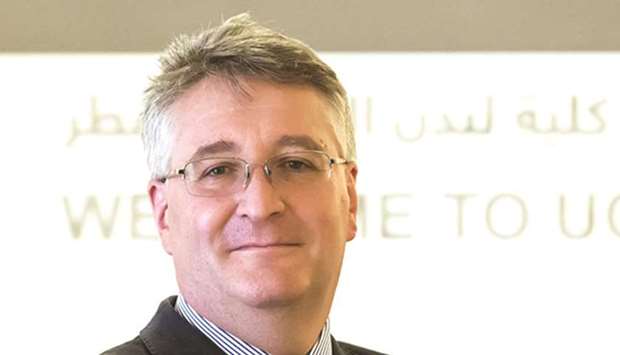In the 1990s, Qatar Foundation (QF) recognised the imperative to equip the national workforce with knowledge, skills and best practices necessary to shape a national vision for galleries, libraries, archives and museums (GLAM) in order to protect, manage, promote and project the nation’s diverse cultural heritage as a public good.
UCL was therefore delighted to form a new partnership in Education City by establishing world-class degree programmes in cultural heritage. QF’s vision was an exceptionally strong call to service, resonating with UCL’s approach of working with partners to achieve fair solutions to global challenges. Since 2010, our partnership has seen UCL Qatar deliver postgraduate and doctoral education programmes in cultural heritage and information management that have drawn on new research and resulted in numerous community and sector engagement initiatives.
As the nation undergoes rapid transformation into a globally engaged, knowledge-based society, preserving Qatar’s unique heritage and culture remains a major national priority. UCL is proud to have contributed to ensuring Qatar remains active in the global community while maintaining its cultural identity and values. It is this heritage that allows Qatar to make a uniquely Arab contribution to modernity.
Research and projects with an impact
During our time in Qatar, UCL Qatar has conducted 100 research projects, conserved over 500 historical objects in our world-class laboratories and attracted 30 internationally-renown visiting scholars from 19 countries. Research is at the heart of our institution and it has strengthened Qatar’s knowledge economy.
One of our early research projects, the Origins of Doha and Qatar, funded by the Qatar National Research Fund (QNRF), saw us conduct a major archaeological excavation in old Doha with Qatar Museums (QM). By delving into the past this work demonstrates how it is possible to better contextualise the present.
Taking the Cultural Heritage Law project as an example, launched under the visionary guidance of QM’s Chairperson, HE Sheikha Al Mayassa bint Hamad bin Khalifa al-Thani, UCL partnered with QM to revisit the existing legislation on cultural heritage, in order to expand ways of protecting, managing and promoting Qatar’s cultural heritage to the highest international standards.
This work aims to provide stronger protection of the nation’s historic cultural elements such as old buildings, traditional clothing etc. to help the community recognise that the art piece they see in a museum, the mosque they’ve just entered or the traditional dance and song at a wedding form part of Qatar’s rich cultural tapestry.
Engaging with the public, community and prominent institutions
Making our expertise available to the community and public was one of our main goals.
Working in partnership with prominent organisations, our programmes and initiatives have reached out to all ages and sections of society, and have included:
l Archaeology workshops taking research projects to Qatari school children – in collaboration with QM.
l Art workshops developed with the Child Life Services team at Hamad General Hospital – a project to create artwork, which was installed on the walls and ceilings of the hospital’s paediatric units.
l Disability focus group at the Museum of Islamic Art (MIA) – organised jointly with the MIA.
l Outreach programmes for children and schools – developed a series of toolkits to support educational programmes in schools on local cultural heritage.
Aiding the next generation of cultural leaders
The long-term sustainability of Qatar’s cultural heritage was a key priority, with a particular focus on contributing to the Qatar National Vision 2030 (QNV 2030).
Our single most important contribution to this ambition is being made daily by the 330 UCL Qatar masters and doctoral alumni, many of who work in renowned institutions such as QM, Qatar National Library (QNL) and Unesco. Most recently our alumni, in collaboration with our academics, have published the book “Studying museums in Qatar and beyond” containing a selection of their own works. The book is accessible on the UCL Discovery open access database and is a testament to UCL Qatar’s aim of supporting student-led research in the fields of cultural heritage.
To further support professional development in the cultural heritage and knowledge management sector, we launched 230 training courses attended by more than 2,500 participants, among them many emerging and established heritage professionals.
Covid-19: overcoming the challenge together
When the global coronavirus pandemic arrived in Qatar, we had to adapt our academic deliverables, events and all other activities to a new reality – just like many other educational institutions across the world.
We worked together to:
l Develop a comprehensive range of teaching and support measures, to ensure that our students could graduate as planned.
l Adapt educational programmes to be delivered online and for vital work to be completed remotely.
l Deliver virtual student exhibitions and hosting major academic conferences such as the 24th International Conference on Electronic Publishing (ElPub 2020) and the 2nd International Conference on Museum Big Data.
l Re-launch online school resources to help parents with home-schooling duties.
Qatar – a country to learn about and learn from
For UCL the opportunity to operate, educate, study and research in Education City with the Qatar foundation, has been a tremendous source of educational inspiration for us, as has our work with many national partners and stakeholders.
Although 2020 hasn’t quite been the final year we hoped for, we are hugely proud of the work of our students, faculty and staff that still made it a huge success. We are looking forward to our virtual closure event “Empowering the Present, Unlocking our Futures” on December 13 during which, together with our partners, stakeholders and many friends, we will fondly reflect on our time in Qatar. With our final graduation we will see our 2019/2020 students join the hundreds of other students that have graduated from UCL Qatar before them, and see them join our community of some 330,000 UCL alumni across the world.

Dr Sam Evans
